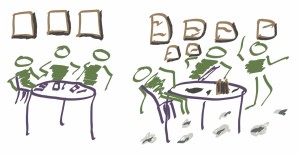Have you ever been in a meeting that went a bit like this?
 Somehow the meeting went off-topic, or a conversation suddenly took over the entire session. What went wrong? Perhaps our conversations were assumption-based rather than fact-based.
Somehow the meeting went off-topic, or a conversation suddenly took over the entire session. What went wrong? Perhaps our conversations were assumption-based rather than fact-based.
Assumptions are very valuable things, they help us to move forward. An obvious example is the assumption that the footpath in front of us is solid, if we doubted this all the time, we would have a lot of trouble walking around, let alone running or jogging.
The less helpful types of assumptions are ones that we make about our own or others definitions of words or level of understanding about a topic. I can remember having 30 minutes of strong debate about an issue a long time ago, only to discover that we were actually arguing for the same thing – just using different terminology.
When planning meetings and workshops, list out the topics that might cause debate or miscommunication and then ask what assumptions we might be making about those topics. Whenever possible, spend some time validating or invalidating those assumptions before the meeting so that we turn those assumption-based conversations into fact-based ones and use our time more effectively.

Kim, I like the quote that Dave uses from time to time – it an’t the things that you don’t know that get you but the assumptions that an’t
These days I reflect the type of meeting in the agenda. If it is high ceremony (governance) then the agenda is well defined and structured but if not then I put little into the agenda and manage for emergence. This avoids making assumptions that prove to invalid!